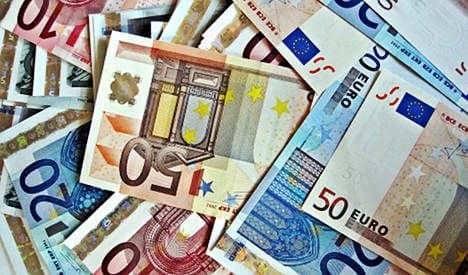Financial transactions tax ineffective: analysts

A proposed financial transactions tax that France hopes other European countries will also adopt is likely to be ineffective and difficult to implement, analysts say.
The plan, promoted by President Nicolas Sarkozy as part of efforts to tame the eurozone debt crisis, centres on a 0.1 percent tax on buying shares in firms with a French headquarters and more than one billion euros in capital.
The finance ministry estimates the tax, which if passed by parliament would take effect on August 1, will bring in €1.1 billion ($1.45 billion) annually to state coffers.
The project will also include a 0.01 tax on naked Credit Default Swaps -- a bet that a country will default on its debt -- and on high-frequency trading, both features of modern markets which critics say stoke volatility and risk.
"Putting such a tax in place, in the run-up to the presidential election, is much more of a political move than an economic one," said Frederik Ducrozet at Credit Agricole CIB.
"In the past, the introduction of such a tax unilaterally in one country has never been proof of its effectiveness," Ducrozet said.
Sweden adopted a transactions tax in the 1980s but had to reverse course when its banks and bankers simply moved offshore, mostly to the City of London, and the proceeds were much lower than anticipated.
"Paris hopes to raise a billion euros a year but we do not know how the government arrived at that figure. Working that out looks very difficult because transaction volumes can vary a great deal," said Jean-Louis Mourier at brokers Aurel BGC.
Analysts said the restricted basis for the tax, which will cover trades in only the largest firms, also crimps its effectiveness.
"As a matter of fairness, it's regrettable that many foreign companies operating (in France) will not be included," said Gilles Moec, chief economist at Deutsche Bank.
As for the tax curbing speculative trading activity, that too is open to question.
"Speculation is far from being only a French problem and does not only affect stock markets -- commodities, currencies and derivative instruments are all even much more involved," said Renaud Murail at Barclays Bourse.
Likewise, the main high frequency trading houses are all based in the United States while from a legal point of view, it is hard to see how such a transaction tax can be put in place.
"How will the state be able to tax transactions which take place on other financial markets? It is not at all clear on this issue," said Mourier of Aurel BGC, with many companies listed on overseas bourses.
For other analysts, however, fears about the tax sparking an exodus of companies to other financial centres are overdone.
"There is no reason for a massive shift," Murail said.
"Paris is a much more essential market place than Stockholm and the tax at 0.1 percent is minimal and should not hit brokerage house profits," he added.
For Daniel Lebegue, a former French treasury head and currently head of the country's branch of the anti-corruption group Transparency International, "the idea of companies moving out is a joke."
Instead, companies "would more likely come to Paris from London where the stock transaction tax is much higher," Lebegue said, referring to the British system of investors paying stamp duty on their trades.
"The tax is just a little bump, the take is small, it does not apply to all transactions and the proceeds expected are much less than those raised in Britain or in Switzerland, for example," he said in remarks to La Croix daily.
Join the conversation in our comments section below. Share your own views and experience and if you have a question or suggestion for our journalists then email us at [email protected].
Please keep comments civil, constructive and on topic – and make sure to read our terms of use before getting involved.
Please log in here to leave a comment.